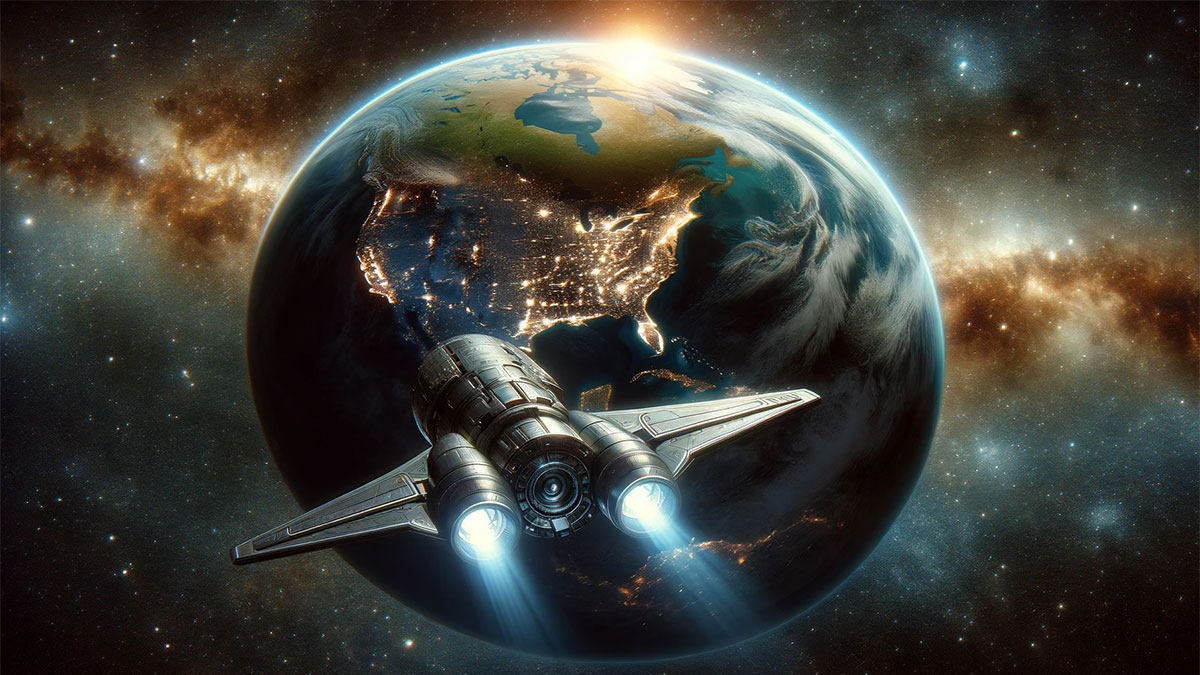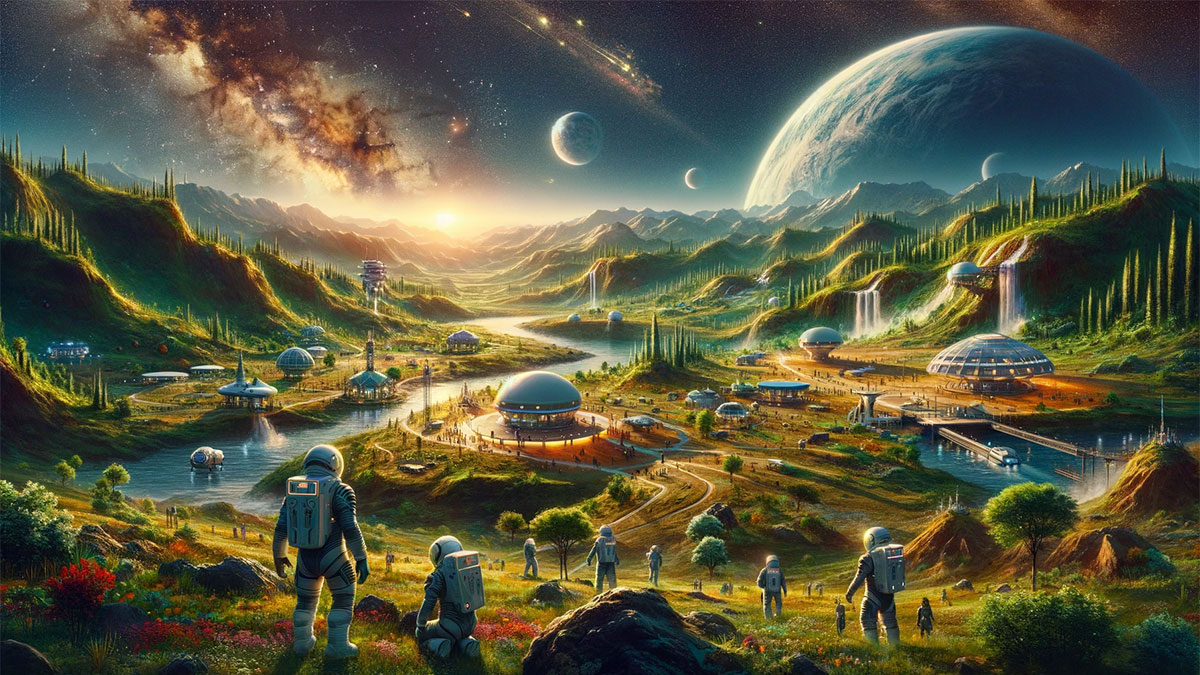Space colonization has been a topic of fascination for decades, with science fiction writers and filmmakers exploring the possibilities of life beyond Earth. Recently, space colonization has become less of a fantasy and more of a reality. With major advances in rocket propulsion and design, astronautics and astrophysics, robotics, and medicine, the prospects of space colonization have become increasingly feasible.
The historical context of space exploration has played a significant role in the development of space colonization. The Space Race of the 1960s between the United States and the Soviet Union spurred rapid progress in space technology and exploration. Since then, space agencies such as NASA have continued to push the boundaries of space exploration, leading to a greater understanding of the challenges and opportunities of space colonization.
Private companies such as SpaceX and Blue Origin have also entered the space race, with ambitious plans to colonize Mars and establish a permanent human presence in space. With the involvement of private companies, the prospects of space colonization have become more feasible, as they bring their resources, expertise, and innovative approaches to space exploration.
Key Takeaways
- Space colonization has become increasingly feasible due to major advances in space technology and the involvement of private companies.
- The historical context of space exploration has played a significant role in the development of space colonization.
- The prospects of space colonization have significant social, cultural, ethical, and legal implications that must be considered.
Historical Context of Space Exploration
Humanity has been fascinated with space exploration for centuries. Since ancient times, people around the world have studied the heavens and used their observations and explanations of astronomical phenomena for both religious and practical purposes. But it was not until the 20th century that space exploration became a reality.
The launch of the first artificial satellite, Sputnik 1, by the Soviet Union on October 4, 1957, marked the beginning of the space age. This event triggered a space race between the Soviet Union and the United States, with both countries competing to achieve various milestones in space exploration.
NASA, the United States’ space agency, was established in 1958, with the goal of exploring space and advancing scientific knowledge. The agency has been responsible for numerous missions, including the Apollo missions that sent astronauts to the moon in the 1960s and 1970s.
Space exploration has come a long way since the early days of the space race. Advances in technology have made it possible to explore outer space in ways that were once unimaginable. Today, spacecraft are capable of traveling to distant planets and moons, and robotic missions are able to explore areas of space that are too dangerous for humans.
The Outer Space Treaty, which was signed in 1967, is an international agreement that governs space exploration and the use of outer space. The treaty establishes principles for the use of space for peaceful purposes and prohibits the placement of nuclear weapons in space.
In 2020, the United States signed the Artemis Accords, a set of principles for international cooperation in space exploration. The accords aim to promote peaceful exploration and the responsible use of space resources.
Space exploration has a rich history that spans centuries. While significant progress has been made in recent decades, there is still much to be learned about the universe beyond our planet. With continued advances in technology and international cooperation, space colonization may become a reality in the not-too-distant future.
The Role of Private Companies in Space Colonization
As space exploration and colonization become more feasible, private companies are playing an increasingly important role in this field. SpaceX, founded by Elon Musk, is one such company that has been at the forefront of the space industry. The company has already made significant strides in space exploration, and it has plans to go even further in the future.
SpaceX has been successful in developing reusable rockets, such as Falcon Heavy, which has the capability of carrying large payloads into space. This has significantly reduced the costs of space exploration and made it more accessible to private companies. The company has also been working on developing a spacecraft that can transport humans to Mars, which could be a significant step towards colonizing the red planet.
Blue Origin, founded by Jeff Bezos, is another private company that is heavily invested in space exploration. The company has been working on developing a reusable rocket called New Shepard, which has already completed several successful test flights. Blue Origin has also been working on a lunar lander, which could be used to transport humans and cargo to the moon.
Virgin Galactic, founded by Richard Branson, is another private company that is focused on space tourism. The company has already completed several successful test flights of its spacecraft, and it plans to begin offering commercial space flights in the near future. While space tourism may not be directly related to space colonization, it could provide a significant source of revenue for private companies that are invested in space exploration.
Private companies are motivated by profits and business opportunities, which could be a significant driving force behind space colonization. As private companies invest more resources into space exploration, they could help make space colonization a reality in the not-too-distant future.
The Feasibility of Space Colonization
Space colonization has been a topic of debate among scientists and space enthusiasts for decades. With the advances in technology, the possibility of colonizing other planets has become more feasible. The following paragraphs will explore the feasibility of space colonization and the challenges that need to be overcome.
Colonizing Mars
Mars has been the focus of many space agencies for colonizing. The red planet is the most habitable planet in the solar system after Earth. It has a similar day-night cycle, seasonal changes, and a thin atmosphere. The atmosphere on Mars is not breathable, and the planet is exposed to high levels of radiation. To make Mars habitable, scientists need to develop terraforming techniques that can create a breathable atmosphere and increase the atmospheric pressure.
Self-Sufficient Colonies
To colonize other planets, the colonies need to be self-sufficient. The colonies need to produce their own oxygen, water, and food. The habitats need to be designed to protect the settlers from the harsh environment of outer space. The colonies also need to be able to withstand solar flares and cosmic radiation.
Space Technology
Space technology is crucial for space colonization. The spacecraft need to be designed to withstand long journeys and harsh environments. The life support systems need to be reliable and efficient. Artificial intelligence can also play a significant role in space colonization by automating tasks and reducing the workload on the settlers.
Infrastructure
Infrastructure is essential for space colonization. The colonies need to have a reliable source of energy, such as solar power. The colonies also need to have a transportation system that can transport settlers and supplies between different colonies. The infrastructure needs to be designed to be scalable and adaptable to the changing needs of the colonies.
Multi-Planetary Species
Space colonization can ensure the survival of humanity. By colonizing other planets, humanity can become a multi-planetary species. This can reduce the risk of extinction due to natural disasters or other catastrophic events.
Space colonization is feasible, but it comes with many challenges. The colonies need to be self-sufficient, and the infrastructure needs to be reliable and scalable. The technology needs to be advanced enough to withstand the harsh environment of outer space. With the right resources and dedication, humanity can become a multi-planetary species and ensure its survival.
The Social and Cultural Implications of Space Colonization
Space colonization is a topic that has gained significant attention in recent years. As humanity begins to explore the possibility of migrating to other celestial bodies, the social and cultural implications of such a move cannot be ignored.
One of the most significant implications of space colonization is its impact on society. Space settlement will require the creation of new communities that will need to be organized and governed effectively. The United Nations has already recognized the importance of space exploration and has established guidelines for the peaceful use of outer space. As more countries, such as China, begin to invest in space exploration, the need for a more comprehensive framework to govern space activities is becoming increasingly apparent.
Another critical factor to consider is the impact of space colonization on culture. The establishment of new communities on other planets will require a significant shift in human culture. Anthropologists and sociologists will need to study the impact of migration to space on human behavior and social structures. The study of human spaceflight will also become increasingly important as we begin to explore the possibility of long-term space missions.
The drivers of space colonization are varied and complex. Some argue that space colonization is necessary for a sustainable future, while others see it as a means of escaping the collapse of civilization. Regardless of the reasons behind it, the success of space colonization will depend on our ability to create sustainable communities that can thrive in a harsh and unforgiving environment.
One of the most significant challenges of space colonization is the need to establish a minimum viable population for a sustainable colony. Biology and evolution will play a critical role in determining the success of space colonization. Anthropologists and biologists will need to work together to understand the impact of space radiation and microgravity on human health and reproduction.
Space colonization has the potential to revolutionize human society and culture. It’s essential to approach this topic with caution and consideration for the many complex factors involved. Through careful planning and research, we can create a sustainable future for humanity beyond our planet.
The Role of Science and Technology in Space Colonization
Space colonization is a complex and challenging endeavor that requires the integration of various scientific and technological disciplines. The success of space colonization relies heavily on the ability of scientists and engineers to develop advanced technologies that can support human life in space.
One of the key areas of focus in space colonization is the development of advanced spacecraft design. Scientists and engineers are working to design spacecraft that can withstand the harsh conditions of space and provide a safe and comfortable environment for humans to live and work in. This includes the development of advanced life support systems that can provide humans with the resources they need to survive in space, such as oxygen, water, and food.
Another important area of focus in space colonization is the development of artificial intelligence systems that can help humans manage the complex tasks associated with living and working in space. AI systems can be used to monitor spacecraft systems, perform scientific experiments, and even assist with tasks such as spacewalks and repairs.
The International Space Station (ISS) has played a critical role in advancing our understanding of the challenges associated with space colonization. Scientists and engineers have used the ISS to test new technologies and study the effects of long-term spaceflight on the human body. This research has helped to inform the development of new spacecraft designs and life support systems that will be needed for future space missions.
The success of space colonization depends on the ability of scientists and engineers to develop advanced technologies that can support human life in space. The development of advanced spacecraft design, life support systems, AI systems, and other technologies will be critical to the success of future space missions.
The Ethical and Legal Challenges of Space Colonization
As space exploration and technology advances, the possibility of colonizing other planets becomes more realistic. With this possibility comes a variety of ethical and legal challenges that must be addressed before any off-planet colonization can begin.
Ethical Questions
One of the most pressing ethical questions surrounding space colonization is whether or not it is morally justifiable to colonize other planets. Some argue that humans have a responsibility to preserve and protect Earth, rather than abandon it in favor of other planets. Others argue that space colonization is necessary for the survival of the human race in the event of a catastrophic event on Earth.
Stephen Hawking, the late physicist and cosmologist, believed that space colonization was essential to the survival of humanity. He argued that the Earth has a limited lifespan and that humans must establish a presence on other planets in order to ensure the continuation of the species.
Legal Challenges
The legal challenges of space colonization are equally complex. The Outer Space Treaty, signed in 1967, is the primary international law governing the exploration and use of outer space. The treaty prohibits the militarization of space and asserts that outer space should be used for peaceful purposes.
The United Nations Office for Outer Space Affairs (UNOOSA) is responsible for overseeing the implementation of the Outer Space Treaty. The European Space Agency and the national space agencies of Russia, the United States, and India are all members of UNOOSA.
In addition to the Outer Space Treaty, the Artemis Accords, signed in 2020, outline a set of principles for international cooperation in space exploration. The Accords emphasize the peaceful exploration and use of outer space, as well as the responsible use of resources.
Space colonization presents a variety of ethical and legal challenges that must be carefully considered before any off-planet colonization can begin. While some argue that space colonization is necessary for the survival of the human race, others believe that it is morally unjustifiable and that humans have a responsibility to protect and preserve Earth.
The Outer Space Treaty and the Artemis Accords provide a legal framework for the exploration and use of outer space, but further discussion and cooperation will be necessary to address the complex challenges presented by space colonization.
The Future of Space Colonization
Space colonization has been a topic of interest for humanity for many years. With the advancement of technology, it is becoming more and more feasible. The idea of colonizing Mars has been discussed by many, including NASA, SpaceX, and Blue Origin. Elon Musk, the CEO of SpaceX, has even set a goal of establishing a self-sufficient human colony on Mars by the 2030s.
One of the biggest challenges of space colonization is creating habitable environments for humans. This includes providing oxygen, food, and water. Mars, for example, has a thin atmosphere with little oxygen, and its soil is not suitable for growing crops.
There have been proposals to terraform the planet, making it more habitable for humans. This process would involve transforming the planet’s atmosphere and surface to make it more Earth-like.
Another challenge is the psychological and sociological impact of living in space. Humans are not designed to live in microgravity, and long-term space missions can have negative effects on the human body, such as muscle and bone loss. Additionally, living in a confined space with a small group of people for an extended period of time can lead to social and psychological issues.
Despite these challenges, there are many drivers for space colonization, such as the desire to explore and discover new worlds, to establish a sustainable future for humanity, and to ensure the survival of the human species. The COVID-19 pandemic has also highlighted the importance of space habitats as a way to isolate and protect humans from infectious diseases.
In addition to Mars, there are other potential locations for space colonization, such as the Moon and asteroids. The Artemis Accords, signed by several countries including the United States and China, aim to establish a framework for human activity on the Moon and other celestial bodies. Private companies such as SpaceX and Blue Origin are also working on space tourism, which could eventually lead to the development of space settlements.
Space colonization is a complex and challenging endeavor, but it holds great promise for the future of humanity. As technology continues to advance and our understanding of space and its potential grows, it is likely that we will see more progress in this area in the coming years.



